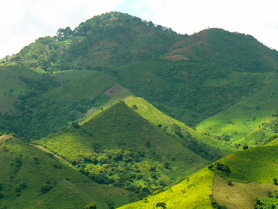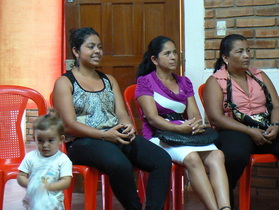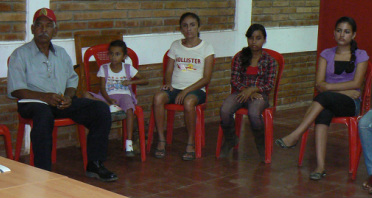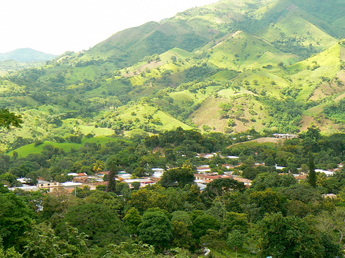 "God's country" - Quilali, Nicaragua Day 40 in Ocotal (and Monzonte) July 6, 2012 Driving back from Quilali, returning from a visit this week to meet with the group of leaders I had met on a previous visit, I snapped the photo to the left. I have described it as "God's country", not because I am religious (far from it - I wobble between agnosticism and atheism, depending on the rhetoric and volume of the religious spokesperson of the day featured in the news) but because I could think of no secular word that hasn't been over-used to describe the majesty and beauty of the hills around this small, remote town. God's country! And it's not lost on me that I am writing this on my 40th day living in Ocotal (and volunteering in Mozonte) - a significant day in the Christian and Muslim faiths. Generally accepted to mean simply "a long time" when the story-teller wasn't sure of the exact length of time, the number "40" is also recognized as being a period of "probation or trial". Noah's Flood, Moses on the mountain, the Israelites wandering in the wilderness during their exodus, Jesus wandering in the wilderness after his baptism and other references in the Bible all point to a period of 40 days. In the Quran, men are only thought to be fully grown and mentally mature after the age of 40 and Muhammad received his first revelation from the angel Gabriel when he was 40. So at my 40-day probationary self-evaluation: where am I, what have I achieved, what have I learned, what have I contributed. One of the strange things about being a "volunteer" is that no-one seems to evaluate my work (at least not formally - I have no doubt there are some "water-cooler" conversations - not that anything close to a water-cooler even exists in the institute). But before I go on, let me tell you a story...  Community leaders (and dependents!) in Quilali It's a perfect, sunny day in what is usually the rainy season but despite the sun, the air is cool due to the height at which Quilali is situated and the breezes gently bring the scent of wood-burning stoves up the hill to where we are working. It couldn't get much better. We are in the meeting room of the town hall again, meeting with 12 community leaders to complete their training in "How To Conduct a Social Audit" - a form of citizenship training designed to hold the local municipality accountable for their promises to complete projects included in their annual budget. The group have completed a social audit of the installation of a potable water supply to one section of the town - some 20 years in the making and at last finished. The session is tedious as the facilitator pulls the information out of the group to complete a form that summarizes the social audit that is to be presented the following morning to the town council. Mostly completing the form for them, she drags the reluctant comments out 4-5 people in the group of 12. The others sit by listening, feeding babies, texting or talking amongst themselves. I detest group-writing projects in any setting and I struggle to stay even partially present. My mind wanders off on a journey that analyzes and finds fault in everything with the session. When I am asked a question by the facilitator to bring me into her role, not only do I not understand the question (my brain has been working in English and the switches don't move too fast!) but I don't even hear it. I am one sour and reluctant participant.  Community leaders (and dependents) in Quilali The session comes to an end with the usual meal of chicken, rice, beans and fried plantains - and there are some comments from the participants about the value of training, how much it has helped, how it has moved the project forward, how they feel more confident, about their ability to speak up. I am not convinced...still mired in some theoretical paradigm of the perfectly designed training session. We get back in the pick-up for the homeward journey. We are loaded up with bags of locally grown, roasted and ground coffee, a live chicken tied in the back (shortly to become soup for the facilitator), bunches of plantains and bananas - all a third of the price up here in this rural town of about 17,000 people. And the facilitator turns to me in the car with a smile about a mile wide, beaming with the success of the session. She hands me a fresh tortilla (thicker and less-uniform than those we find in the US), with the smell of smoke from the wood-fired stove where they were cooked, and a hunk of fresh cheese, made that morning - white, salty and different. She calls her colleague in the institute and glows as she tells her of the outcome, both agreeing that this should be used in the future as a case study for why their methodology works. She is clearly pleased. I turn to look out of the window and snap another photo of God's country, realizing that I was missing the point, that I had missed the point all the way through the morning, that I had failed to change my lens.  The town of Quilali among the hills of Las Segovias So where am I, what have I achieved, what have I learned, what have I contributed. And more to the point, how do I learn to change my lens while still staying focused on what I can bring to the table? At my 40-day probation, I continue to vascillate. Between moments of serenity and presence when I slow down, breath, see and hear what's around me and discover a sense of the possibilities for what I can and I am doing here. And moments when I wonder if I will ever really speak Spanish, if I am making a scrap of difference, if it even matters. Part of the problem is the context in which I am volunteering at the institute. Working in a country that survives on volunteer efforts, subsidies, discounted oil, handouts by the ship load, "Jesus teams" from the US and a revolving door of people coming in to do good, help, make a difference and learn something along the way. My in-the-moment thoughts (which are almost never the most reasoned or balanced) are that the people coming to help actually take away more than they leave behind, in terms of their own growth, photos, entries in blogs, stories and an education in how to look at the world, colonization and US/world politics through the lens of this poor, tiny country. And not only do they leave richer, but they leave the country even more co-dependent than when they arrived. This, I was told today by a 23 year old Peace corps volunteer, is at the heart of the challenge of "aid": how to give it, how to administer it, how to measure it's effectiveness. Sadly, our conversation was not untypical of a conversation with someone 30 years younger than myself: short on depth, partially connected, competing for her attention with her laptop, her Email and her connection to the digital world. In fairness, she only occasionally gets access to any Internet, so this was a luxury and I should have appreciated this or negotiated our time better. But what I was aching for was an answer, a connection between my energy, the real world I have placed myself in and an outcome I could embrace. What I was left with was a feeling of melancholy, questions and a greater sense of disconnection. And I know, this too shall pass. But for the moment, I honor the questions and feelings until they pass.
1 Comment
Jim Miller
7/14/2012 01:28:43 am
Dearest Richard,
Reply
Leave a Reply. |
BackgroundI sold house, car and most of my furniture to move to the small town of Ocotal in Las Segovias on the Honduras/ Nicaragua border. Archives
March 2014
Categories |
Contact© Copyright 2018 Richard Richards, Bournemouth, Dorset, UK
|

 RSS Feed
RSS Feed
